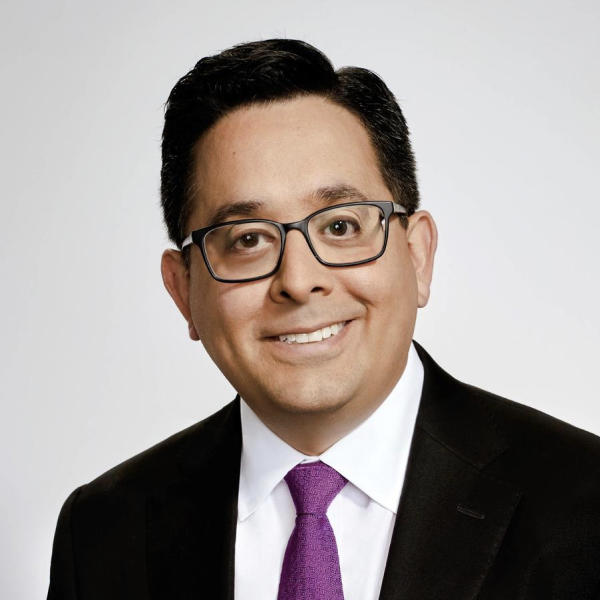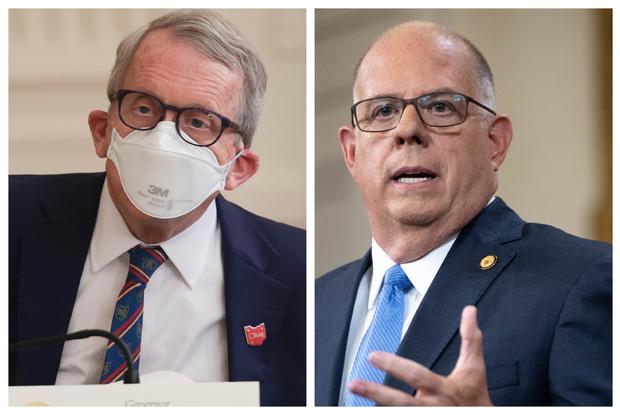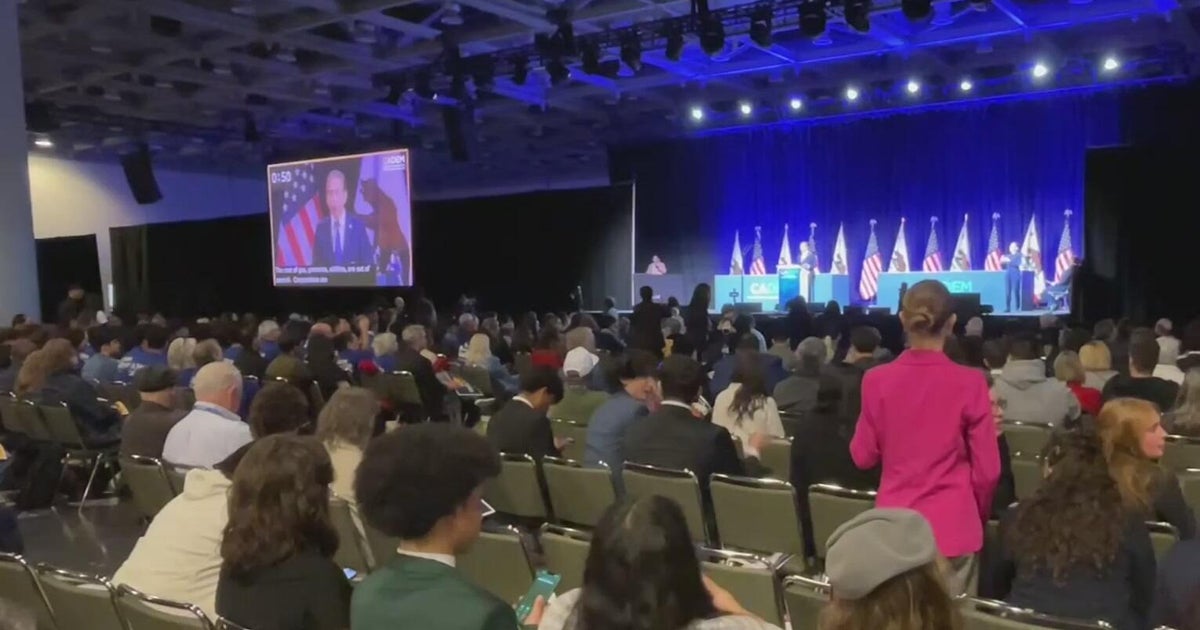What Mike DeWine and Larry Hogan say about 2022, 2024 and how Biden is handling the pandemic
Maryland's Larry Hogan and Ohio's Mike DeWine are among the most popular governors in the nation among their home state residents. But within the Republican Party, they're facing challenges that reflect the current state of the party.
In Ohio, DeWine faces a Republican primary opponent Jim Renacci, who is sharply critical of how he's overseen the Buckeye State's pandemic response. And the crowded GOP primary field of U.S. Senate contenders take issue with the governor's positive assessment of his handling of the public health crisis. Many of them have made the lockdown measures DeWine took at the onset of the pandemic — which were similar to those taken by Democratic governors — a centerpiece of their campaigns.
In Maryland, Hogan is being wooed for a run against Democratic Senator Chris Van Hollen, whom national Republicans believe would be vulnerable to a challenge from a governor with approval ratings that top 70% in some surveys. Those polls also show strong enough support among Black, Latino and women voters, making him an especially appealing general election candidate in a state that hasn't elected a Republican senator in more than 40 years.
Hogan, however, is a moderate who has openly criticized former President Trump over his handling of the pandemic, as well as those in his own party whose actions he thinks have been driven by fear of retaliation by Trump.
President Biden, whom both governors saw on Sunday at a dinner hosted by the National Governors Association and again on Monday, is poised to spend much of the midterm campaign year trying to draw sharper contrasts with Republicans.
"What are Republicans for? What are they for? Name me one thing they're for," he said earlier this month.
DeWine said Republicans "are for opportunity" and cited his work on expanding early childhood education and economic development –-- including recently announced plans by semiconductor giant Intel to spend $20 billion constructing two microchip plants near Columbus.
Hogan said Republicans like him remain focused on the future. "All I can see is a lot of frustrating divisiveness and dysfunction in Washington and a lot of finger-pointing on both sides. I think Republicans — some of them continue to be focused on the past and their view of what happened in 2020. And Democrats I think are moving too far to the left, way away from where the rest of the country is. And I think about 77% of the people are just really frustrated."
Asked about the attacks from Renacci and leading GOP Senate candidates including Josh Mandel and J.D. Vance, DeWine dismissed it all as evidence of personal ambition and candidates stoking frustrations dredged up by the pandemic.
"It's been tough for people. So I understand people not being happy with everything that's going on that the government has done," DeWine said Saturday in an interview with CBS News. "We've taken, I think, a very balanced approach. We've had to make some tough decisions. Some people didn't like the decisions and you have a primary."
DeWine is one of four Republican governors facing a primary challenge this year. Former president Donald Trump has not endorsed DeWine's challenger yet, as he has in Georgia, but DeWine says he's not too worried about it.
"I've had a good relationship with President Trump. We're gonna do fine in this race. We're gonna win the primary and we're gonna win the general election," he said.
In Maryland, Trump has endorsed State Delegate Dan Cox for governor, bucking Hogan. Hogan can't run for another term due to term limits, and he has backed Maryland Commerce Secretary Kelly Schulz.
Hogan is trying to build an infrastructure for Republicans outside of Trump's mold as he contemplates a future run for president in 2024. He has until the state's February 22 deadline to jump into the Senate race against Van Hollen, but Hogan on Saturday again dismissed the idea.
"I've never really expressed any interest whatsoever in being a U.S. senator. I've said that every time they've asked for more than a year now, but that hasn't stopped them from continuing to push and ask," he told CBS News.
"I care about the problems in Washington. I do want to be a voice of reason. But it's a big difference going from running a state to being one of 100 people who argue all day and don't seem to get much done," he added.
Hogan believes his high approval rating in the state, his more pragmatic brand of Republican politics as well as his party's desire to flip control of the Senate this year, are why party leaders keep asking him to run. And he is confident he could win if he runs.
"I've been saying, 'Thanks.' But I haven't thrown them out the door yet," Hogan said about the requests to run. "People are making pretty cogent arguments about [it], but it's not something I aspire to… I don't want to go argue with people all day. But people are saying to me, 'We think you can make a difference.' And you know, I care very deeply about the country."
A potential 2024 presidential candidate, Hogan said he has "a lot of time to think about" a run as he serves out his last year as governor. But he does believe there's a lane for a candidate like him.
"I'm a traditional Republican. And maybe it's not where a lot of people are today in the Republican base, but I can tell you, there's somewhere over 40% of the people, who are not supporting Trump, don't want Trump to run again. That's a pretty big lane, especially if you have eight or ten people all fighting in that other lane," he said.
"But," he added later, "whether or not there's a path, I'm not sure."
On the COVID-19 pandemic, both governors expressed confidence in the way their states are responding, with Hogan touting some of the nation's highest vaccination rates. Maryland embraces public health, given in part that it's the home of the National Institutes of Health and other major hospitals and medical research centers.
But he criticized the Biden administration's federal response, blaming "the mixed messaging where we just constantly get conflicting guidance."
Asked which element of the federal government is sparking the confusion – the White House or federal agencies – Hogan said much of it "does come out of the CDC but some at the FDA, some at different places, but the White House has to get control of it. Speak with a clear voice and, and be responsive to the governors who really have been on the frontlines of this thing for more than two years."
DeWine says there's still work to do with the White House on acquiring more tests as his state sees a high number of positive cases and deaths due to the Omnicron variant.
Looking ahead, his biggest concern about the pandemic is the unknown.
"The best medical people, researchers in the world can't tell you what's going to happen next. Omicron was very, very contagious– we're still dealing with it in Ohio. But by and large, was not as lethal as what we have seen before with the Delta. So the question is what is next and I don't think anyone knows," he said.
Jacob Rosen contributed to this report.






